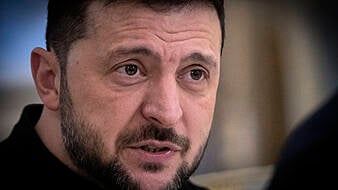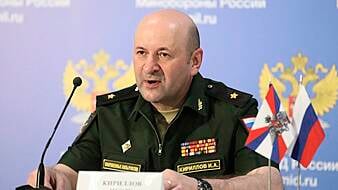What you need to know right now:
- U.S. President Joe Biden and Chinese President Xi Jinping spoke on a video call about Russia's invasion of Ukraine, with Chinese media citing Xi as saying that such conflicts were in no-one's interests.
- Washington seeks to isolate Moscow from the one big power that has yet to condemn its invasion of Ukraine.
- Ukraine's food supply chains are breaking down and the conflict is leading to "collateral hunger" across the world, U.N. food aid agency warned.
- Ukrainian President Volodymyr Zelenskiy said rescue work continued to save hundreds of people still believed to be trapped under the rubble of a bombed theatre in the besieged city of Mariupol.
- Kyiv officials said 222 people were killed in the capital since the start of the war, including 60 civilians and four children.
- Border crossings from Ukraine have slowed in recent days but could rise again if conditions in the west of the country worsened, U.N refugee agency said. U.N. says 3.27 million have fled since Feb. 24, with further 2 million displaced inside the country.
- U.N. rights office reported 816 confirmed civilian deaths.
- Russian forces have made minimal progress this week," Britain said in a daily intelligence update. It said Russian attempts to surround Kyiv and Mykolaiv have been pushed back while heavy Russian shelling of encircled cities of Kharkiv, Chernihiv, Sumy and Mariupol continued.
- Ukraine expects progress on its EU membership bid within months, President Zelenskiy said after a call with the head of EU executive Ursula von der Leyen.
- After optimistic signals earlier this week, both Kyiv and Moscow described their peace talks as difficult.
- Poland will formally ask for an U.N. peacekeeping mission in Ukraine at the next NATO summit, its prime minister said.
- Russia's central bank kept its key rate at 20 per cent and announced purchases government bonds in the face of a spike in inflation and a looming economic contraction.
- The International Energy Agency announced a 10-point plan to cut oil use as Russia's invasion of Ukraine adds to supply concerns.
- Moscow averted a debt default with interest payments on two dollar bonds this week, but faces a busy payment schedule in weeks ahead.

8:40pm: U.S. President Joe Biden warned Chinese leader Xi Jinping on Friday of 'consequences' if Beijing gave material support to Russia's invasion of Ukraine, the White House said, while both sides stressed the need for a diplomatic solution to the crisis.
While the White House did not detail what those consequences could be, or how the U.S. would define "material support", press secretary Jen Psaki indicated China's massive trade flows could be impacted.
"Sanctions are certainly one tool in the tool box," Psaki told a regular news briefing when asked whether China, the world's largest exporter, could face trade tariffs or sanctions.
Speaking after a nearly two-hour video call between Biden and Xi, Psaki said the United States would communicate any consequences directly to Beijing "with our European partners and counterparts."
In the call, which came at a time of deepening acrimony between the world's two biggest powers, Biden detailed efforts of the United States and its allies to respond to the invasion of Ukraine, including by imposing costs on Russia.
"He described the implications and consequences if China provides material support to Russia as it conducts brutal attacks against Ukrainian cities and civilians," the White House said in statement, adding that Biden "underscored his support for a diplomatic resolution to the crisis."
A senior U.S. official briefing reporters on the call said Biden communicated that Beijing would face consequences not just from the United States but the wider world.
"The president really wasn't making specific requests of China," the official said. "I think our view is that China will make its own decisions."
China's foreign ministry said Xi told Biden the war in Ukraine must end as soon as possible and called on NATO nations to hold a dialogue with Moscow. He did not, however, assign blame to Russia for the invasion, based on Beijing's statements about the call.
"The top priorities now are to continue dialogue and negotiations, avoid civilian casualties, prevent a humanitarian crisis, cease fighting and end the war as soon as possible," Xi said.
Xi advocated Russia-Ukraine dialogue and negotiations, and suggested Washington and NATO conduct talks with Russia to solve the "crux" of the Ukraine crisis and resolve the security concerns of both Russia and Ukraine.
"The Ukraine crisis is something that we don't want to see," Chinese state media quoted Xi saying in the call, which it said was requested by the U.S. side.
5:33pm: The United States and Western allies slammed Russia on Friday for spreading propaganda, disinformation and "nonsense" at the United Nations Security Council by alleging that parts of biological weapons were being made in Ukraine.
Russia's U.N. Ambassador Vassily Nebenzia sent a lengthy document, seen by Reuters, to the council and U.N. Secretary-General Antonio Guterres on Friday on Moscow's accusation that there are "military biological programs" in Ukraine.
"The Ministry of Defense is receiving more and more material and analyzing that. We will continue to keep the international community informed about the unlawful activity carried out by the Pentagon on Ukrainian territory," Nebenzia told the council.
It was the second time in two weeks that the 15-member council met on the topic at Russia's request. Britain's U.N. Ambassador Barbara Woodward described Russia's move as "disinformation of the desperate."
"We've had a rehash of amateurish disinformation, which we discussed and debunked last Friday. It was nonsense then, and it is nonsense now," she told the council on Friday.
The United Nations has said it was not aware of any biological weapons programs in Ukraine, and U.N. disarmament affairs chief Izumi Nakamitsu told the council on Friday that the world body does not have "the mandate nor the technical or operational capacity" to investigate Russia's information.
The U.S. ambassador to the United Nations, Linda Thomas-Greenfield, on Friday accused her Russian counterpart of "a tirade of bizarre conspiracy theories" last week.
"This week we're hearing a whole lot more where that came from, things that sound like they were forwarded to him on a chain email from some dark corner of the internet. President Biden has a word for this kind of talk: 'Malarkey,'" she said.
Thomas-Greenfield also said "it is possible that Russia may be planning to use chemical or biological agents against the Ukrainian people," but did not cite any evidence for Washington's concerns.
Russia called the meeting on Friday to replace a planned vote on a Russian-drafted call for aid access and protection of civilians in Ukraine. Diplomats said the measure would have failed, while Nebenzia accused Western countries of a campaign of "unprecedented pressure" against it.
3:36pm: There is no evidence to suggest that Russian President Vladimir Putin's overall intent in Ukraine has altered despite the invasion failing to reach its original objectives, a Western official said on Friday.
"I've seen nothing which suggests that the original intent of Putin has significantly altered," the official said, speaking on condition of anonymity.
"Therefore ... the difference between what was planned, what is being executed is at the moment, one of timing and they have failed to achieve their objectives in the time that they set out in their original objectives and their original plan."
1.30pm: The UN rights office has said at least 816 civilians had been killed and 1,333 wounded in Ukraine through to March 17th.
Most of the casualties were from explosive weapons such as shelling from heavy artillery and multiple-launch rocket systems, and missile and air strikes, the group added.
The real toll is thought to be considerably higher since the group, which has a large monitoring team in the country, has not yet been able to verify casualty reports from badly-hit cities like Mariupol.
12.32pm: Ukrainian president Volodymyr Zelenskiy said he has spoken with the head of the European Commission Ursula von der Leyen on Friday and expects progress to be made on Ukraine's application to join the EU in the coming months.
"Had substantial conversation with EC President," Mr Zelenskiy said on Twitter. "EC opinion on UA (Ukraine) application for #EU membership will be prepared within few months. UA Government and EC are instructed. Moving to our strategic goal together."
Had substantial conversation with EC President @vonderleyen.
EC opinion on UA application for #EU membership will be prepared within few months.
UA Government and EC are instructed. Moving to our strategic goal together.— Володимир Зеленський (@ZelenskyyUa) March 18, 2022
Mr Zelenskiy's depute chief of staff, Andrii Sybiha added Ukraine will not abandon its bid to join the EU in order to reach a compromise with Russia as part of any agreement to end the war.
"I will be categorical, this is absolutely unacceptable. It is our choice, the application for EU membership has been submitted and now it is being put into practice," he said, adding that negotiations with Russia were ongoing but difficult.
Elsewhere, authorities in Kyiv said 222 people had been killed in the capital since Russia's invasion of Ukraine began, including 60 civilians and four children. A further 889 people have been wounded, including 241 civilians, the Kyiv city administration said in a statement.
11.22am: Ukrainian Foreign Minister Dmytro Kuleba on Friday said he had spoken with the European Union's foreign policy chief Josep Borrell about a further package of sanctions against Russia over the war in Ukraine.
"We discussed the preparation of the 5th EU sanctions package on Russia. Pressure will keep mounting as long as it is needed to stop Russian barbarism. We also discussed protection and help for Ukrainians who fled from Russian bombs to the EU," he said on Twitter.
Meanwhile, a World Food Programme (WFP) official has said food supply chains in Ukraine were collapsing, with a portion of infrastructure destroyed and many grocery stores and warehouses now empty. Jakob Kern, WFP emergency coordinator for the Ukraine crisis, also expressed concern about the situation in "encircled cities" such as Mariupol, saying that supplies were running out and that its convoys had not yet been able to enter the city.
11am: This comes as a UN refugee agency official said daily crossings by people fleeing violence in Ukraine have slowed in recent days, saying warmer weather might be a factor. "We have seen a slowdown, a general slowdown," Matthew Saltmarsh said via videolink from Poland. However, he warned that any escalation of violence in the Western Ukrainian city of Lviv might cause crossings to rise again.
Elsewhere, Russia's communications regulator Roskomnadzor said it has demanded that Google stop spreading what it labelled as threats against Russian citizens on its YouTube video-sharing platform.
Roskomnadzor said adverts on the platform were threatening the life and health of Russian citizens and that their dissemination was evidence of the US tech giant's anti-Russian position. Google did not immediately respond to a request for comment.
10.21am: Russian president Vladimir Putin told German chancellor Olaf Scholz during a phone call on Friday that Kyiv was attempting to stall peace talks with Russia but that Moscow was still keen to continue negotiations.
"It was noted that the Kyiv regime is attempting in every possible way to delay the negotiation process, putting forward more and more unrealistic proposals," the Kremlin said in a readout of the call. "Nonetheless the Russian side is ready to continue searching for a solution in line with its well-known principled approaches."
In the call, Mr Scholz again called for a ceasefire and stressed that the humanitarian situation needed to be improved and progress needed to be made in finding a diplomatic solution as soon as possible.
The discussions come as over 2 million refugees have entered Poland from Ukraine since the start of the Russian invasion, according to the Polish border guard.
9.51am: Ukraine's state emergency service said a multi-storey teaching building was shelled on Friday morning in the eastern city of Kharkiv, killing one person, wounding 11 and trapping one person in the rubble.
Shells also hit the eastern city of Kramatorsk on Friday, killing two people and wounding six, governor Pavlo Kyrylenko said in an online post.
Elsewhere, Britain's media regulator, Ofcom, said on Friday it has revoked Russian-backed television channel RT's licence to broadcast in the UK with immediate effect.
"We do not consider RT to be fit and proper to hold a UK licence and cannot be satisfied that it can be a responsible broadcaster," Ofcom said on Twitter.
In response, RT said the regulator had unfairly revoked its broadcasting licence, accusing it of being nothing but a tool of the British government.
8.45am: Russian missiles struck an area near the airport of the western Ukrainian city of Lviv early on Friday, the mayor said, while Japan and Australia imposed new sanctions on Russian entities as punishment for the invasion of Ukraine.
Western sources and Ukrainian officials said Russia's assault has faltered since its troops invaded on February 24th, further dashing its expectations of a swift victory and the removal of Ukrainian president Volodymyr Zelenskiy's government.
Russia has relied heavily on missiles and shelling to subdue Ukraine's forces but has yet to secure any of its 10 largest cities.
At least three blasts were heard near Lviv's airport on Friday morning, with videos on social media showing large explosions and plumes of smoke rising.
Lviv's mayor, Andriy Sadovy, said several missiles had struck an aircraft maintenance facility, destroying buildings but causing no casualties. The city has escaped significant fighting so far.
In the capital, Kyiv, one person was killed and four wounded when parts of a Russian missile fell on a residential building in the northern part of the city on Friday morning, emergency services officials said.
Despite battleground setbacks and punitive sanctions by the West, Russian president Vladimir Putin has shown little sign of relenting.
His government says it is counting on China to help Russia withstand blows to its economy.
The United States is concerned China is "considering directly assisting Russia with military equipment to use in Ukraine," US secretary of state Antony Blinken said.
US president Joe Biden, who described Mr Putin as a "murderous dictator", will make clear to Chinese president Xi Jinping in a call Friday that China "will bear responsibility for any actions it takes to support Russia's aggression", Mr Blinken told reporters.
The two heads of state are due to speak at 9am Eastern time (1pm Irish time), the White House said.
China has declined to condemn Russia's actions in Ukraine or call them an invasion. It says it recognises Ukraine's sovereignty but that Russia has legitimate security concerns that should be addressed.
A Chinese foreign ministry official met this week with Russia's ambassador to China to exchange views on counter-terrorism and security cooperation, the ministry said in a statement.
Sides far apart
Japan and Australia announced separate measures sanctioning Russian individuals and organisations, including two oligarchs with links to Australia's mining industry, as well as Russia's state-owned arms exporter, its finance ministry and central bank.
The UN human rights office in Geneva said it had recorded 2,032 civilian casualties in Ukraine - 780 killed and 1,252 injured.
Some 3.2 million civilians have fled to neighbouring countries, the United Nations said.
Ukraine hopes to evacuate civilians on Friday through nine humanitarian corridors from cities and towns on the front line of the fighting, the country's deputy prime minister Iryna Vereshchuk said.
A fourth straight day of talks between Russian and Ukrainian negotiators took place on Thursday by videolink, but the Kremlin said an agreement had yet to be reached.
Kyiv and its Western allies say Russia launched the war to subjugate a neighbour Mr Putin calls an artificial state. Russia says it is carrying out a "special operation" to disarm Ukraine.
Digging for survivors
Rescuers in Mariupol, a southern port city, dug survivors from the rubble of a theatre that officials said had been hit by an air strike on Wednesday as civilians took shelter there from bombardments. Russia denies striking the theatre.
Mariupol has suffered the worst humanitarian catastrophe of the war, with hundreds of thousands of civilians trapped in basements with no food, water or power. City officials say they are not able to estimate the number of casualties from the theatre, which had the Russian word for "children" marked outside and visible on satellite images.
Russia's foreign ministry spokesperson Maria Zakharova said the assertion that Russia had bombed the theatre was a lie.
Russia's defence ministry said separatists in east Ukraine with help from Russia's armed forces were "tightening the noose" around Mariupol and there was fighting in the city centre, Russia's RIA Novosti news agency reported.
Northeastern and northwestern suburbs of Kyiv have suffered heavy damage but the capital itself has held firm, under occasional curfews and subjected to deadly rocket attacks nightly.
A building in Kyiv's Darnytsky district was extensively damaged on Thursday. As residents cleared glass, a man knelt weeping by the body of a woman covered in a bloody sheet.
Viacheslav Chaus, governor of the region centred on the front-line northern city of Chernihiv, on Thursday said 53 civilians had been killed in 24 hours. The toll could not be independently verified.
One of those killed was a US citizen, Jimmy Hill, who was gunned down while waiting in a bread line, his family said.







